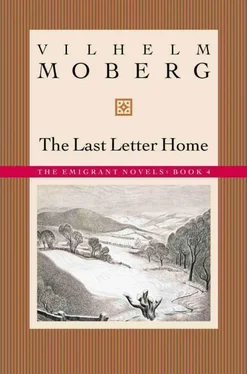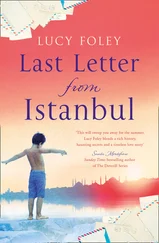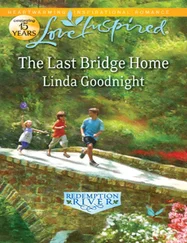III. THE FIRST COMMANDMENT FOR EMIGRANTS
Thou shalt not regret Thy emigration,
Thou shalt love America as Thy young
Bride and Sweden as Thine Old Mother.
— 1—
In the evening Kristina dug around the Astrakhan apple tree under the east gable of the house. With her fingers she pulled out quickroot and other weeds, with the spade she piled a bank of black earth round the trunk. In this way her old father in Duvemåla had attended to the fruit trees in fall. This tree, grown from a seed from her parents’ home in Sweden, was already taking on height and breadth. The sapling was now a young tree that had bloomed three springs. But as yet it had produced no fruit. Two springs in succession the blossoms had withered away from severe night frost. Last spring was warmer and the blooms remained, but at fruiting time the tree was covered with caterpillars which gnawed on the stems, and during a storm in June the unripe apples fell to the ground.
The seasons in America were unpredictable and unreasonable. Her Astrakhan tree had suffered badly from exposure so far each year. But the Sweden sapling was still in its early youth and it would surely bear fruit in another year.
The bank of topsoil was ready and Kristina straightened her back and rested her foot on the spade. She had not yet done the evening milking. Johan and Harald had driven the cows into the corral at the barn. Round and about lay the fields where the stubble left from harvested crops shone golden brown in the clear evening light. The sugar maples to the front of the house had changed the color of their leaves to deep yellow and the oaks beyond the field stood rust-red. Already in the mornings a sprinkle of frost, like drops of milk, glittered on the grass. And gusts of wind had begun to feel chilly against the cheeks — the autumnal wind which harrowed the ground with rough strokes.
Soon winter would knock at the door, Kristina’s twelfth winter in North America. She wondered if she would still be alive when the next snow melted and next spring arrived.
Since her miscarriage two and a half years ago she had not enjoyed the same health and strength as before. However little she worked she felt tired and her limbs weak. Her body strength simply would not return. After her childbeds she had quickly recuperated, but perhaps it was harder for a woman to bear a stillborn child than a living one. She suffered also in her soul: the sorrow that she — in bearing a lifeless offspring — had brought death into the world.
From time to time she was bothered with pain in her lower abdomen. The pain might disappear for a few days but it always came back. She wondered if this had anything to do with her great fatigue. Every evening when she went to bed she feared she might be unable to rise next morning. And how she would have liked to stay in bed in the morning! She felt as if she had only just tasted the rest, barely sipped of the refreshment. She would have liked to stay in bed for weeks and months and only enjoy herself. Perhaps this tiredness would remain in her body as long as life itself remained.
But death did not frighten her any more. The day before Robert walked into the forest and lay down to die at the side of a brook he had pointed out to her how he had reconciled himself to leaving this world: He had stopped complaining to the Lord about life and death and was satisfied with man’s lot in life: Believe me, Kristina, Death can bring nothing evil to me — I am untouchable! Now she herself had gained the same conviction: She had conquered the worldly; death could not reach her soul. Why should she fear death which could take nothing from her except this earth, which everyone must lose?
She had over the years harbored longings for earthly things and tried to be satisfied with this world. It bothered her that life offered so much of goodness and beauty which others enjoyed but which she never would have an opportunity to partake of. She suffered because the lot of the emigrant had fallen on her. Year after year she suffered here in America from the thought that never would she return to the land of her childhood and youth. A homeland had once been given to her — she had lost it, and she could never have a new one. Her mind would never be at peace because of her longing for home. She lived as an unhappy and strayed creature and was afraid she might be lost to eternity. Until God rough-handedly showed her the right way and she accepted her lot; until she got rid of her worldly inclination and opened her mind to the thoughts of eternity. Only then did she know that her soul-suffering and inner disturbance were not caused by her inability to liberate herself from the old homeland, but rather that she was unable to give up this world.
The emigration was not her unlucky fate. How could a move on this earth affect a person? What did it matter if she lived her fleeting days in one place on the globe or another? Why was she concerned about dying in one spot or another? In the New World or in the Old? In Sweden or North America? She had her permanent home in a land she could never lose.
There was only one move now that meant anything to Kristina: her soul’s liberation from the body, the move from one life to another, from temporal life to eternity. From this belief sprang her understanding of her life on earth.
And once she had reconciled herself to her fate no more uneasiness disturbed her. Nothing that happened in this world worried or frightened her. But for her husband who shared her life and for the children she had borne into this world she harbored love’s anxiety. She had entrusted them to the Creator: Give me strength to endure a few years more! Don’t make my children motherless as yet!
Every evening Kristina thanked God that she had been granted another day with Karl Oskar and her children.
— 2—
Another day was counted out of her life. She leaned the spade against the house and went into the kitchen for her milkpans.
Karl Oskar had driven to Taylors Falls today and was not yet back. She wondered why he was late. She had sent him on an errand to Anders Månsson’s since he anyway was so close.
As Kristina sat on her milking stool in the stable, her thoughts wandered to Anders Månsson, who had come here before them and had housed them in his cabin during their first months in the Territory. He had been struck by the same misfortune as she — homesickness. But he had sought other aid than she: He tried to drink away his regret over his emigration. He ruined himself and his possessions with the American brännvin. She had heard that he had been forced to sell his last cow, and she felt sorry for Fina-Kajsa and her son that they had now no milk. Her thoughts went to the day when Anders Månsson had lent them the milch-cow Lady during their first winter in the wilderness. The milk had helped her save the lives of her children that winter. Now they themselves had a cow that had just calved and today she had sent milk and some biestings-pudding to the Månssons with Karl Oskar.
Before she was through with the milking she heard the sound of a spring wagon as it stopped before the stable door: Karl Oskar was back. A few moments later he came into the stable.
She noticed at once that his expression was not his usual one. He was tense; his lips were contracted, and his eyes under the wrinkled brows were severe.
Did he bring a message of accident or misfortune?
“Has anything happened?”
“Don’t be upset. Nothing has happened to me, but when I came to Anders Månsson’s this morning. .”
During the last days Fina-Kajsa and her son had often been in Kristina’s thoughts. Perhaps it had meant something?
She received the answer as she now heard what Karl Oskar had to relate.
Читать дальше












